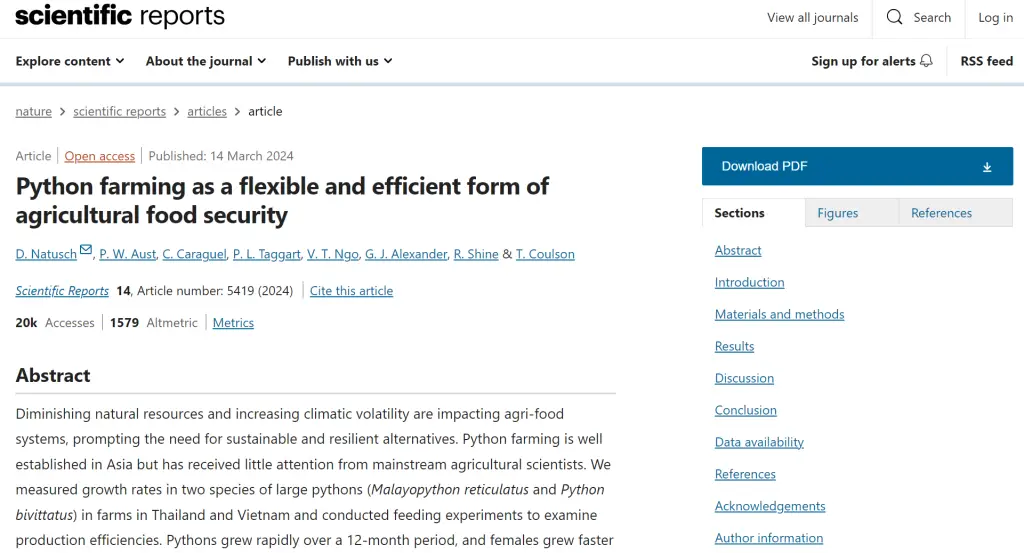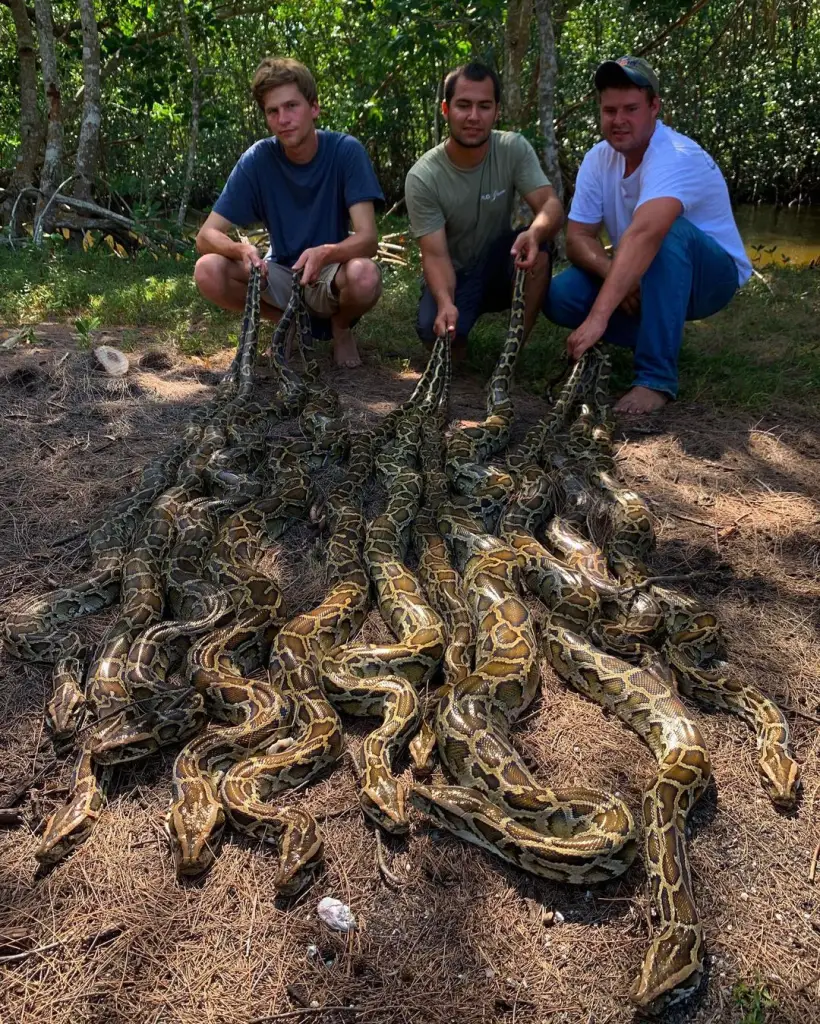Tired of the same old meats? Well, hold onto your chef’s hats because we’re about to embark on a wild journey into the world of sustainable and mouthwatering alternatives!
That’s right, Recent findings from the prestigious Scientific Reports magazine suggest that python farming could be the savory solution we’ve been waiting for to tackle food shortages and environmental woes.
So, if you’re ready to spice up your palate and make money, buckle up because we’re about to unravel this delicious possibility!
And nowhere but the Florida Everglades are Pythons more plentiful.
The Eco-Friendly Reptile
The study, led by researchers from the University of Newcastle in Australia, meticulously analyzed the environmental footprint of python farming in comparison to traditional livestock production.
Through rigorous data collection and analysis, the team uncovered startling revelations about the sustainability of these slithering creatures.
One of the key findings highlighted in the report is the remarkable feed conversion efficiency of pythons.
These reptiles can convert a staggering 34% of their feed into edible protein, surpassing the efficiency of chickens (28%), pigs (22%), and cattle (8%).
This remarkable trait translates into a significantly lower demand for resources, such as land and water, making python farming an attractive option for regions grappling with resource scarcity.
The study revealed that pythons require a mere 4% of the water needed for beef production and a fraction of the land used for traditional livestock farming.
You heard that right: pythons only require 4% of all the water needed for beef production
Summin up: Their ability to thrive in captive environments and their low-maintenancecontribute to their eco-friendly credentials, minimizing the environmental impact associated with their production.

A Taste of the Exotic
But While the idea of consuming python meat may seem unconventional to some, those who have dared to sample this delicacy often draw comparisons to a familiar favorite: chicken.
The white meat of pythons is described as having a texture and flavor remarkably similar to that of poultry, but with a subtle gamey undertone that adds an intriguing depth of flavor.
This similarity to chicken can be attributed to the fact that both pythons and chickens are members of the reptile and bird families, respectively, which share a common evolutionary ancestor.
As a result, their muscle fibers and protein structures are relatively comparable, leading to a familiar taste profile.
However, python meat is not a mere imitation of chicken; it boasts its own unique qualities.
When grilled to perfection, python steaks develop a delectable char and caramelized crust, further enhancing their flavor complexity.

Overcoming Cultural Barriers
It may take some time for Western palates to fully embrace this culinary adventure.
However, as the world faces increasing food insecurity and environmental challenges, python farming could provide a viable solution, particularly in regions where eating reptiles is more culturally accepted.
Iit is essential to recognize that what is considered “exotic” is often a matter of cultural perspective and familiarity.
In various parts of Asia, Africa, and even some regions of the Americas, the consumption of snake meat is not only accepted but celebrated as a delicacy.
For instance, in certain areas of Southeast Asia, snake-based dishes are an integral part of the local cuisine, with specific preparations and cooking methods passed down through generations.
Similarly, in some African countries, the hunting and consumption of various snake species, including pythons, have been practiced for centuries by indigenous communities.
Even within Western societies, there are parts of the southern United States, where rattlesnake meat has found its way onto menus, blending into the region’s diverse culinary landscape.
The restaurant El Santuari in Barcelona cooked this python into a dish below.

A Sustainable Solution
Beyond its culinary appeal, python farming offers numerous environmental benefits. These reptiles require minimal water and can thrive on locally sourced food sources, such as rodents and byproducts. 1
Additionally, their sedentary nature and low-maintenance housing make them an efficient choice for sustainable protein production.
However, While the idea of python farming and consuming these reptiles as a sustainable protein source is intriguing, recent studies have raised concerns about the potential mercury contamination in pythons inhabiting the Everglades region of Florida.
I know what all your Florida folks are thinking!
As highlighted in the video “Don’t Eat The BURMESE PYTHON Because…,”1 the Everglades ecosystem is known to have high levels of mercury contamination due to atmospheric conditions and pollution.
This mercury can accumulate in the food chain, with top predators like the invasive Burmese pythons being particularly vulnerable.
A decade-old study by the U.S. Geological Survey found alarming levels of mercury in Everglades pythons, with some individuals containing up to 3.5 parts per million (ppm) of the neurotoxin.
To put this into perspective, the state of Florida considers fish with more than 1.5 ppm of mercury unsafe for human consumption.
The high mercury levels in Everglades pythons are puzzling, as these snakes typically prey on animals lower in the food chain, such as rodents and birds, which are not expected to accumulate significant amounts of mercury.
As a precautionary measure, experts advise against eating pythons from the Everglades until further research can establish safe consumption guidelines.
So guys, go ahead and catch it but don’t cook it just yet.
The Future of Protein

As the discussion around python farming and consumption continues to gain traction, one Florida hunter has already embraced this sustainable protein source with open arms – and taste buds.
Donna Kalil, a renowned python hunter and leader of the Everglades Avenger Team, has not only dedicated her life to eliminating these invasive predators from the Everglades ecosystem but has also incorporated their meat into her culinary adventures.
Kalil, who has caught over 700 pythons to date, recognizes the potential of these reptiles as a sustainable food source.
In a bold move to raise awareness and challenge cultural perceptions, she has taken to cooking and consuming the very pythons she hunts.
During her hunting expeditions, Kalil has been known to share python-based treats with her crew, such as chocolate chip cookies made with python eggs.
While the initial reaction may have been one of hesitation, these culinary experiments serve as a testament to her commitment to promoting sustainable and unconventional food sources. 2
Beyond the novelty factor, Kalil’s embrace of python meat aligns with the broader goal of reducing food waste and maximizing the utilization of resources.
By consuming the very pythons she helps remove from the Everglades, she is contributing to a circular economy and demonstrating the viability of this protein source.
Kalil’s culinary adventures with python meat extend beyond her hunting crew.
She has been known to host python meat tastings and cooking demonstrations, introducing curious individuals to the unique flavors and textures of this unconventional protein.
Through these events, she aims to educate the public and challenge preconceived notions about what is considered edible and sustainable.